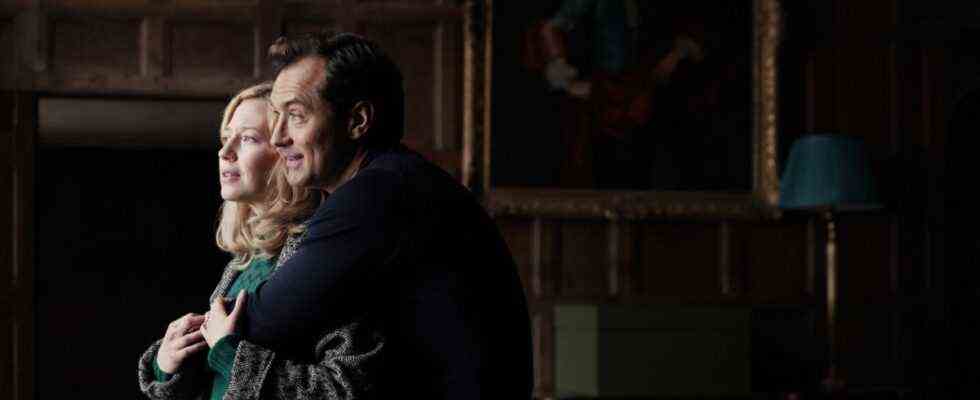Again and again you feel like you’ve gotten into a horror movie, even though it said “Family Drama”. In the stately home to which the O’Hara family has moved, the wooden floors creak. It’s so dark as if the architects had forgotten the windows in the 17th century. A castle like a depression turned to stone. The back door, just locked, will open again in a moment. Outside the expensive black horse neighs.
Rory O’Hara has moved his family here from a comfortable, bright bungalow house with pool in the American suburbs. To England, where he grew up and now promises great success in a new job as a commodities trader. When his wife, daughter and son arrive in the taxi, he plays the enthusiastic successful man. He leads her through the house, which only has a few pieces of furniture here and there. But: Led Zeppelin recorded an album here. This is what counts for Rory, it’s easy to tell at dinner parties.
You can hear the fear behind Rory’s confident business laugh
Director Sean Durkin – “The Nest” is only his second big film – knows exactly what he’s doing when he turns off the lights on this family in England. The tone of his slowly unfolding film is right at all times. The threatening nature of the images corresponds to the feeling that this family, which could be a happy one, is actually a bit bad. Despite the horror genre conventions that “The Nest” serves, there are no ghosts to haunt them. What haunts the O’Haras are the turbo addiction of the eighties, in which the film is set, and the driven insecurity of father Rory.
Jude Law has one of his best performances ever here. He plays this Rory, who comes from a simple background, charming and driven, while trying to get really rich with his last bit of energy. You can hear the fear behind his confident business laugh on the phone. He always wants to go up because he is always afraid of losing everything.
And yet at one point Carrie Coon almost outshines him as his wife Allison. She can do both: proudly wearing her hair dryer at elegant receptions, as if she were really the happy woman at a successful man’s side. But during the day she shovels dung on the farm next door to earn a little financial cushion – in case everything collapses that her megalomaniac husband built on a non-existent foundation. One suspects from their looks and brief exchanges with Rory that it would not be the first time.
Sean Durkin drew the material for “The Nest” from his own childhood experiences. Born in Canada, he moved to the UK and later to New York. What interests him between Rory and Allison is the strange durability of this marriage, which has certainly often stood on the brink and can actually only feed on an old-fashioned gender relationship. Allison is a down to earth woman who knows what’s good for herself and her family. But this knowledge keeps silencing them. Perhaps out of love for her handsome man, with whom sex is still passionate. But perhaps it is also the image of women in the 1980s that inhibits them. “It’s not your job to worry,” Rory once told her. But she is too intelligent for that.
Watching Carrie Coon play Allison’s slowly flaring rebellion against her felix-o’clock husband is fantastic. At a fine dinner with Rory’s business partners, he talks about his alleged love for the theater. And suddenly it is too much for her, she starts laughing out loud, grunts while taking a breath, calls it a “shit” that he is telling. Then she goes and dances alone in a pub. It is the night that this family’s lies break open, a silent disaster. On the gray morning after, there is cornflakes in the haunted castle.
The Nest – Having everything is never enough, GB 2020 – Directed and written by Sean Durkin. Camera: Mátyás Erdély. Music: Richard Reed Perry. Starring: Jude Law, Carrie Coon, Oona Roche, Charlie Shotwell. Ascot Elite / 24 images, 107 minutes.

